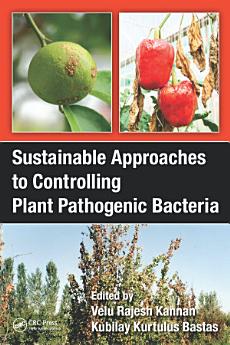Sustainable Approaches to Controlling Plant Pathogenic Bacteria
ამ ელწიგნის შესახებ
The book covers many aspects of the activities of pathogenic bacteria that interact with plants. With chapters contributed by experts, the book focuses on:
- Pathogenesis
- Epidemiology
- Forecasting systems
- Control measures including diagnosis, quarantine, and eradication
- Adoption of agro-traditional practices
- Tools for the control of antibacterial polypeptides
- Nutrient supplements
- Metabolic substances from other organisms
- Mechanisms of siderophores
- Host resistances
- Quorum sensing and quenching
- Seed and foliar applications
- Impact of plant pathogens on scientific and economic levels
The editors’ approach provides a broad perspective, including modern trends in ecology that consider plant pathogenic bacterial control from all angles. The discussions and reviews in the book cover a wide range of aspects of plant pathogenic bacterial pathogenicity, epidemiology, and impact on the food chain as well as strategies for control, which will help you develop sustainable methods for controlling plant diseases.
ავტორის შესახებ
Dr. Velu RAJESH KANNAN, currently working as Assistant Professor of Microbiology in Bharathidasan University, Tiruchirappalli, Tamilnadu, India, is Botany graduate from Madurai Kamaraj University. He obtained his master degree in Plant Sciences and Ph.D. from Bharathiar University, Coimbatore, Tamilnadu, India. As a faculty his 15 years of research and teaching won him several awards including CSIR and DST Young Scientist Fellowships. He has produced 8 Ph.Ds. 30 M.Phils. and presently guiding at 8 Ph.Ds. M.Phils. and completed several major research projects and some are in progress. He extends his service as member of board of studies in Microbiology, Biotechnology, Botany and Life Sciences and member of reviewer in more than 50 international reputed scientific journals and is an editorial board member in several scientific publications. His research specialization is "Rhizosphere Biology and Bioremediation".
He has published more than 80 research papers and several review articles in international refereed journals and an edited book in Springer entitled "Microbiological Research in Agroecosystem Management" (2013). Further, he has deposited nearly 100 microbial rRNA sequencing and 9 pyro sequencing in NCBI Genbank. He has organized 2 scientific conferences at national level, delivered keynote address in International conference in Taiwan, and several talks in All India Radio. His is active membership in professional bodies of Indian Science Congress Association, International Mycorrhizae Research Society, International Plant-Microbes Interactions Association, International Ecological Association, Indian Association of Biomedical Scientists and Association of Microbiologists of India. He has also visited in several Asian and European countries to present papers and to participate in deliberations.





